初三英语Unit 1 How do You Study for a Test
(九年级英语教案)Unit1Howdoyoustudyforatest?全英文教案

Unit1Howdoyoustudyforatest?全英文教案九年级英语教案unit1 how do you study for a test?ⅰ. analysis of the teaching materialsin this unit, students learn to talk about how to study. such topic is very useful to students. it’s helpful to raise learning interest of all the students. either more or less advanced students will benefit a lot.1.the first period mainly gives students listening and oral practice using the target language "how do you study for a text? i study by doing…".2.the second period gives students more listening and oral practice using more target languages. they are helpful to improve students’ listening and speaking skills.3. in the third period, students learn to get detailed information from an article. it is a basic reading skill and is a great help to improve students’ reading skills.4. the fourth period not only introduces some new words but also provides students with many different kinds of activities. in this class, students learn to give advice to those who have difficulty in studying .5.the fifth period is designed to train students’ reading and writing skills.ⅱ. language functiontalk about how to study.ⅲ. target language1. how do you study for a test?i study by working with friends.2. have you ever studied with a group?yes, i have. i’ve learned a lot that way.3. i don’t have a partner to practiseEnglishwith. maybe you should join anEnglishlanguage club. ⅳ. structureverb + by\ with gerundⅴ. vocabulary。
九年级英语全册 Unit 1 How do you study for a test

Unit 1 How do you study for a test?The Fourth PeriodⅠ.Teaching Aims and Demands1.Knowledge Objects(1) Key Vocabularycomma, make mistakes, spoken, pronounce, slowly, challenge, solutionWhy don't you …?(2) Target LanguageI don't have a partner to practice English with.Maybe you should join an English language club.2.Ability Objects(1) Train students' writing skill.(2) Train students' ability to understand the target language in spoken conversation.(3) Train students' ability to use the target language.3.Moral ObjectWhen you have difficulty in doing something, you must make up your mind to overcome it. Ⅱ.Teaching Key Points1.Key Vocabulary:comma, make mistakes, Why don't you …?2.Target LanguageI don't have a partner to practice English with.Maybe you should join an English language club.Ⅲ.Teaching Difficult PointTalk about how to solve the problems students meet with while learning English. Ⅳ.Teaching Methods:1.Listening method 2.Practice methodⅤ.Teaching Aid:A tape recorderⅥ.Teaching ProceduresStep Ⅰ Revision(1) Check homework. Get some students to read out their writings about how to do something new. Collect their writings and help correct any errors. Display the writings on the back wall of the classroom.(2) Brainstorm ways of learning English. Ask, How do you study for a test? Collect answers from students.S1 : I study by working with a group.S2: I study by listening to cassettes.Step Ⅱ 1aThis activity reviews earlier vocabulary and introduces some new words.Read the instructions to the class. Call students' attention to the box. Read the list of problems students have when learning English to the class.Show students the meaning of each item. For example, pretend to misspell a word on the blackboard and then cross it out and misspell it, again. In this way, students know the meaning of the sentence I can't pronounce some of the words. Use the same approach to explain the meanings of the other items.Step Ⅲ 1bThis activity provides writing practice using the target language. Read the instructions to the students. Invite a student to read out the sample answer to the class.Choose the problems that many students have.Optional activityAsk a student to choose a way of learning English that he/she thinks the most helpful. Then have him/her come to the front of the classroom and teach the class how to use this method.Step Ⅳ 2aThis activity gives students practice in understanding the target language in spoken conversation.Say, Some of the things are difficult for Paul. Listen to the conversation and check the learning challenges that Paul talks about. Point out the sample answer. Play the recording for the first time. Students only listen. Play the recording a second time. This time students listen and check the learning challenges Paul talks about.Check the answers with the whole class:1, 2, 3, 5Step Ⅴ 2bThis activity gives students practice in understanding the target language in spoken conversation.Point to the list of solutions in the box.Set a time limit of one minute. Students read them through silently.Point to the checked challenges in Activity 2a.Say, You will listen to the conversation again and write the number of each challenge in Activity 2a in front of the correct solution in Activity 2b. Point out the sample answer.Play the recording again. Students write the numbers in the blanks.You may wish to play it once again so that students have an opportunity to check their answers themselves. Answers:a.2 b.5 c.1 d.3Step Ⅵ 2cThis activity provides oral practice using the target language. Invite a pair of students to read the sample conversation to the class.Write the sample conversation on the blackboard.Read the instructions. Say, Please make conversations using information from the earlier activities in pairs. As students work, move around the room listening in on various pairs so that you can check progress and help with pronunciation as needed.After students have had a chance to practice several exchanges, ask pairs to come to the front of the classroom and say their conversations to the class.Step ⅦSummarySay, In this class, we've mainly talked about how to solve problems you meet with while learning English.Step Ⅷ HomeworkEach student chooses a way of learning English he/she thinks the most helpful. Then find a partner who is not successful in this method and teach him/her how to use the method effectively.Step Ⅸ Blackboard DesignUnit 1 How do you study for a test?Section BThe Fourth Period1.Learning problems:I can't pronounce some of the words. 13I can't understand spoken English. 28I read very slowly. 10I can't spell some English words. 11I make mistakes in Grammar. 252.Target language:A: I don't have a partner to practice English with.B: Maybe you should join an English language club.教学反思(二)年月日本课培养了学生的英语听、说及灵活运用英语等能力。
九级上册单词巧记句型语法剖析(Unit Howdoyoustudyforatest)

九年级上册单词巧记句型语法剖析Unit 1How do you study for a test三点剖析单词·巧记·典句·考点【巧记提示】 a+loud (adj.大声地【经典例句】朗读对每一个英语学习者来说都是必要的。
【考点聚焦】 1)当朗读课文时,一定要用aloud。
如:Reading aloud is different from reading loudly.朗读课文与大声地读课文是有区别的。
2)与aloud 意思相近的词为loudly。
当表示“大声地”时两个词可以相互代替。
如:Who is knocking at the door loudly (aloud)?谁在大声地敲门?【巧记提示】 memor(y)( n.记忆力)+-ize (动词后缀)【经典例句】他就是那个过目不忘的人。
【考点聚焦】掌握它的名词memory 的用法。
1)作“记忆,纪念”讲时,memory 是不可数名词。
如:In memory of Lei Feng,we made a film.为了纪念雷锋,我们拍了一部电影。
2)当memory 指的是“个人的记忆力或记忆的事情”时,是可数的。
如:He has a bad memory for dates.他对日期的记忆力很差。
memories of childhood 童年时的记忆。
【巧记提示】 different(adj.不同)+-ly(副词后缀【经典例句】 Trying to act differently举止与众不同,不会总是对的。
【考点聚焦】注意different adj.,difference n.及differently adv.的词性的不同。
如:Everyone is different from the others.每一个人都与其他的人不同。
I can not tell the differences我说不出这两幅图之间的区别。
【人教版】九年级英语上册《Unit1Howdoyoustudyforatest?》方法技巧

UNIT 1 How do you study for a test?方法技巧1.动名词的用法同学们也许对动名词的提法并不感到陌生,但相信大家对它并没有全面而细致的了解,现在我们就一起来学学动名词吧!动名词是由v.+ing 构成的,变化规则和现在分词一样。
动名词具有名词的性质,在句中可以作主语、宾语和表语等。
同时,它又具有动词的特点,可以接宾语构成动名词短语。
动名词所作句子成分例句主语Seeing is believing.眼见为实。
宾语We all like singing.我们都喜欢唱歌。
表语Your task is cleaning the room.你的任务是打扫房间。
定语Our school has a r eading room.我们学校有一个阅览室。
教你一招:巧记只跟动名词作宾语的动词或词组,有些动词或词组只跟动名词作宾语,你能快速掌握它们吗?请试试下面的顺口溜吧!学习英语有点难,忙于放弃摆面前(be busy,give up),不禁期望你喜欢(can’t help,look forward to,enjoy),介意作业做不完(mind,finish),优美文章值得看(be worth),继续练习莫推延(keep on,practice,put off)。
2. 议论文三部曲议论文是以议论为主要表达方式,通过摆事实、讲道理表明作者见解或主张的一种文体。
在近几年的中考试题中,出现了不少写议论文的题目。
写议论文需要确立论点,并辅之以充分的论据加以论证。
论点、论据和论证被称为议论文的三要素。
在英语议论文的写作中,应注意三个事项:(1)论点的基本要求是观点正确、认真概括、有实际意义。
(2)论据的基本要求是真实可靠、充分典型。
(3)论证的基本要求是推理符合逻辑。
英语议论文的结构一般较为固定,通常包括三个部分:(1)导语在导语部分提出需要议论的议题。
(2)正文在正文部分对所提出的论点进行论证。
(3)结论在结论部分对以上的论证进行总结和归纳。
九年级英语Unit 1 How do you study for a test知识精讲
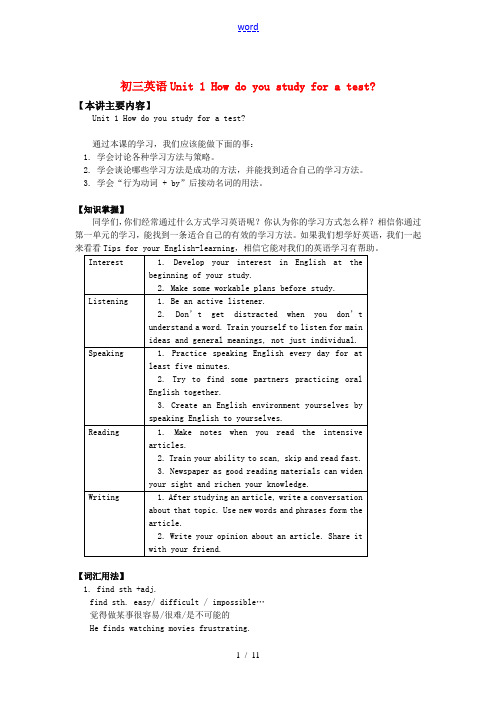
初三英语Unit 1 How do you study for a test?【本讲主要内容】Unit 1 How do you study for a test?通过本课的学习,我们应该能做下面的事:1. 学会讨论各种学习方法与策略。
2. 学会谈论哪些学习方法是成功的方法,并能找到适合自己的学习方法。
3. 学会“行为动词 + by”后接动名词的用法。
【知识掌握】同学们,你们经常通过什么方式学习英语呢?你认为你的学习方式怎么样?相信你通过第一单元的学习,能找到一条适合自己的有效的学习方法。
如果我们想学好英语,我们一起【词汇用法】1. find sth +adj.find sth. easy/ difficult / impossible…觉得做某事很容易/很难/是不可能的He finds watching movies frustrating.他认为看电影是令人不愉快的。
He said that, after Russian, I should find German easy.在学过俄语之后,我应该觉得德语容易学。
find it +adj. to do sth.He found it almost impossible to express what he wanted to say.他觉得要表达他想说的话几乎是不可能的。
think it + adj + to do sthWe thought it unnecessary to argue with him about it.2. end up +doing sth. 结果为……;以……结束(尤其指意料之外的事情)We were going to go out, but ended up watching videos.我们原计划外出,但结果却是在家看录像。
3. It is +adj. +for sb. to do 对于某人来说,做某事是……的It is impossible for us to finish the work without your help.对于我们来说,没有你的帮助来完成工作是不可能的。
九年级上How do you study for a test
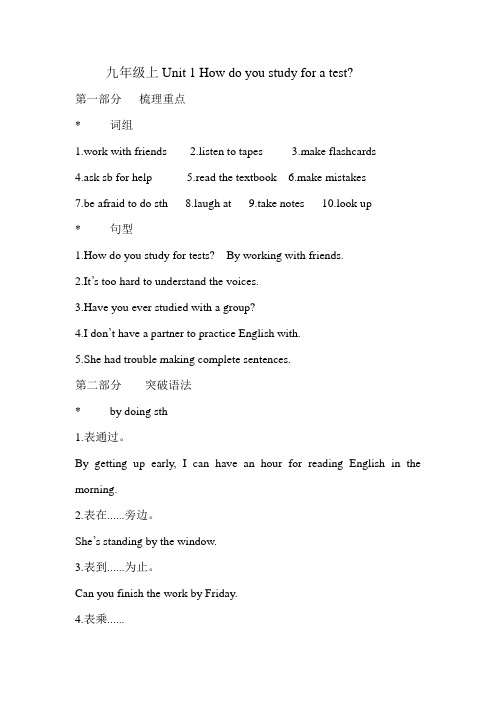
九年级上Unit 1 How do you study for a test?第一部分梳理重点* 词组1.work with friends2.listen to tapes3.make flashcards4.ask sb for help5.read the textbook6.make mistakes7.be afraid to do sth ugh at 9.take notes 10.look up* 句型1.How do you study for tests? By working with friends.2.It‟s too hard to understand the voices.3.Have you ever studied with a group?4.I don‟t have a partner to practice English with.5.She had trouble making complete sentences.第二部分突破语法* by doing sth1.表通过。
By getting up early, I can have an hour for reading English in the morning.2.表在......旁边。
She‟s standing by the window.3.表到......为止。
Can you finish the work by Friday.4.表乘......I often go to school by bike.第三部分巩固练习一.填空。
1.Do you learn English by ________(watch) English-language videos?2.What about _______(listen) to an English song?3.We got _______(excite) when we heard the good news.4.Do you know the best way _______(deal) with the problem?5.He finds watching English movies ________ (frustrate).6.I think _______(speak) English is more difficult than written English.7.She is a quick ______(learn),and her English has got better day by day.8.Be more careful! Don‟t make any _______(mistake) in your writing.9.I can‟t follow what you are saying.Could you please speak more _______(slow).10.The man laughed when he ______(realize) what had happened. 二.翻译。
人教九年级 Unit 1 How do you study for a test
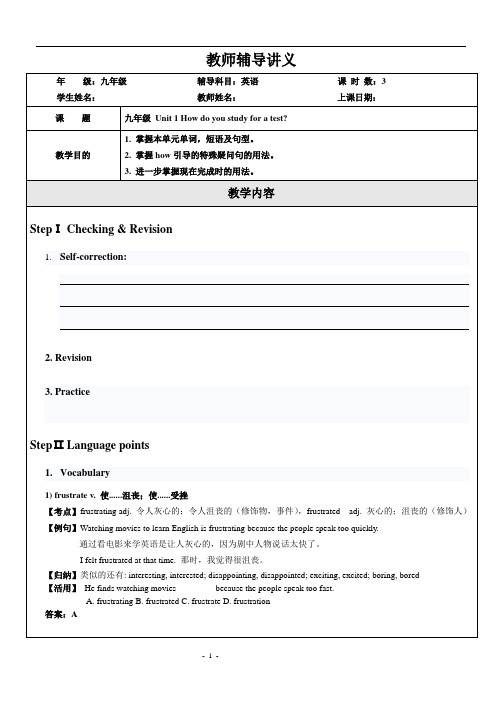
3.Practice
1.Vocabulary
1) frustrate v.使......沮丧;使......受挫
【考点】frustrating adj.令人灰心的;令人沮丧的(修饰物,事件),frustrated adj.灰心的;沮丧的(修饰人)
【例句】Watching movies to learn English is frustrating because the people speak too quickly.
【拓展】pronunciation n. “发音,读音”
【例句】Do you know how to pronounce the letter?你知道这个字母怎样发音吗?
Your pronunciation of the English word is wrong.你那个英文单词的发音是错误的。
3) excite (v.) “使(sb.)兴奋”
【考点】sth excites sb.“某事使某人感到兴奋”excited表示某人对某物或某事“感到兴奋,激动”,主语常为人。
exciting作“令人激动的”,“令人兴奋的”解时,常用来修饰物或事。
【例句】The news excited us.这个新闻使我们激动。
We were excited when we saw our team was winning.看到自己的球队要赢了,我们都十分激动。
【考点】=if not引导条件状语从句。
【例句】They will go on with the game unless there is a rain.如果不下雨,他们会继续这一比赛。
Don’t come unless I call you. = Don’t come if I don’t call you.如果我不给你打电话,不要来。
九年级英语 Unit 1 How do you study for a test 讲解与练习
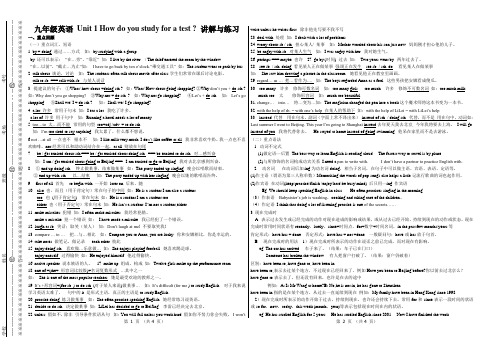
第 1 页 (共4 页) 第 2 页 (共4 页)学校 姓名 班级 考场 考号---------------------------------○密------------------ -------------------○封----------------------------- -- --○线----------------------------※※※※※※※※※※※※※※※答※※※※※※※※※※※※※※※※※※题※※※※※※※※※※※※※※※※线※※※※※※※※※※※※※九年级英语 Unit 1 How do you study for a test ? 讲解与练习一、重点回顾 (一)重点词汇、短语1. by + doing 通过……方式 如:by studying with a groupby 还可以表示: ―在…旁‖、―靠近‖ 如:I live by the river. / The thief entered the room by the window.―在…以前‖、―截止…为止―如: I have to go back by ten o’clock.―乘交通工具‖ 如:The student went to park by bus. 2. talk about 谈论,讨论 如:The students often talk about movie after class.学生们常常在课后讨论电影。
talk to sb. === talk with sb. 与某人说话3. 提建议的句子: ①What/ how about +doing sth.? 如:What/ How about going shopping? ②Why don’t you + do sth.? 如:Why don’t you go shopping? ③Why not + do sth. ? 如:Why not go shopping? ④Let’s + do sth. 如: Let’s go shopping ⑤Shall we/ I + do sth.? 如:Shall we/ I go shopping?4. a lot 许多 常用于句末 如:I eat a lot. 我吃了许多。
初三第一单元Unit 1 How do you study for a test
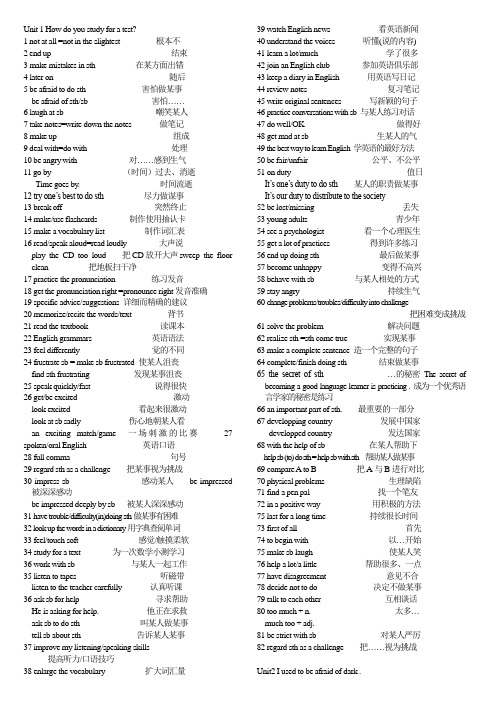
Unit 1 How do you study for a test?1 not at all =not i n the sli ghtest 根本不2 end up 结束3 make mi stakes i n sth 在某方面出错4 later on 随后5 be afrai d to do sth 害怕做某事be afraid of sth/sb 害怕……6 laugh at sb 嘲笑某人7 take notes=wri te down the notes 做笔记8 make up 组成9 deal wi th=do wi th 处理10 be angry with 对……感到生气11 go by (时间)过去、消逝Ti me goes by. 时间流逝12 try one’s best to do sth 尽力做谋事13 break off 突然终止14 make/use flashcards 制作使用抽认卡15 make a vocabulary li st 制作词汇表16 read/speak aloud=read loudly 大声说play the CD too loud 把CD放开大声sweep the fl oor clean 把地板扫干净17 practi ce the pronunci ati on 练习发音18 get the pronunciation right =pronounce right发音准确19 speci fi c advi ce/suggesti ons 详细而精确的建议20 memorize/reci te the words/text 背书21 read the textbook 读课本22 Engli sh grammars 英语语法23 feel di fferently 觉的不同24 frustrate sb = make sb frustrated 使某人沮丧find sth frustrating 发现某事沮丧25 speak qui ckl y/fast 说得很快26 get/be excited 激动look excited 看起来很激动look at sb sadly 伤心地朝某人看an exci ting match/game 一场刺激的比赛27 spoken/oral Engli sh 英语口语28 full comma 句号29 regard sth as a challenge 把某事视为挑战30 i mpress sb 感动某人be impressed 被深深感动be impressed deeply by sb 被某人深深感动31 have t roubl e/di ffi cul ty(i n)doi ng sth做某事有困难32 l ook up the word s i n a di cti onary用字典查阅单词33 feel/touch soft 感觉/触摸柔软34 study for a text 为一次数学小测学习36 work wi th sb 与某人一起工作35 li sten to tapes 听磁带listen to the teacher carefully 认真听课36 ask sb for help 寻求帮助He i s asking for hel p. 他正在求救ask sb to do sth 叫某人做某事tell sb about sth 告诉某人某事37 i mprove my li steni ng/speaking skills提高听力/口语技巧38 enlarge the vocabulary 扩大词汇量39 watch Engli sh news 看英语新闻40 understand the voi ces 听懂(说的内容)41 learn a lot/much 学了很多42 j oin an Engli sh cl ub 参加英语俱乐部43 keep a diary in English 用英语写日记44 review notes 复习笔记45 wri te origi nal sentences 写新颖的句子46 practi ce conversati ons wi th sb 与某人练习对话47 do well/OK做得好48 get mad at sb 生某人的气49 the best way to learn Engli sh 学英语的最好方法50 be fair/unfai r 公平、不公平51 on duty 值日It’s one’s duty to do sth 某人的职责做某事It’s our duty to di stribute to the society52 be l ost/mi ssing 丢失53 young adults 青少年54 see a psychologi st 看一个心理医生55 get a l ot of practi ces 得到许多练习56 end up doi ng sth 最后做某事57 become unhappy 变得不高兴58 behave wi th sb 与某人相处的方式59 stay angry 持续生气60 change p robl ems/t roubl es/di ffi cul ty i nto chal l enge把困难变成挑战61 solve the problem 解决问题62 realize sth =sth come true 实现某事63 make a complete sentence 造一个完整的句子64 compl ete/fi nish doing sth 结束做某事65 the secret of sth …的秘密The secret of becomi ng a good l anguage l earner i s practi ci ng . 成为一个优秀语言学家的秘密是练习66 an i mportant part of sth. 最重要的一部分67 developping country 发展中国家developped country 发达国家68 wi th the hel p of sb 在某人帮助下hel p sb (to) do sth = hel p sb wi th sth帮助某人做某事69 compare A to B把A与B进行对比70 physi cal problems 生理缺陷71 find a pen pal找一个笔友72 i n a posi tive way 用积极的方法75 last for a l ong ti me 持续很长时间73 fi rst of all首先74 to begin with 以…开始75 make sb laugh 使某人笑76 help a lot/a little 帮助很多、一点77 have di sagreement 意见不合78 deci de not to do 决定不做某事79 tal k to each other 互相谈话80 too much + n. 太多…much too + adj.81 be stri ct wi th sb 对某人严厉82 regard sth as a challenge 把……视为挑战Unit2 I used to be afraid of dark .1 used to 过去常常He used to be thin .I used to like ridi ng . I di dn’t use to like tests.2 be interested i n =take an i nterest in 对…感兴趣3 be afrai d of=be terrifi ed of 害怕4 go to sl eep with the light on 开着灯睡觉5 eat candy [U] 吃糖6 chew gum [U] 嚼口香糖7 chat wi th sb=have a chat wi th sb 与…聊天8 Fuzhou Daily Newspaper 福州日报9 daily life 每天的生活10 die(u)-dead(adj)-death(n) 死He died i n 1990. He has been dead for 3 years.He i s dying. 他将死./临终11 afford sth/to do sth 负担得起He coul dn’t afford to pay for hi s child’s education.12 cause a lot of trouble (for sb.) 引起很多麻烦13 get into trouble wi th the police 陷入警察手里14 be patient with sb 对…有耐心15 finally=in the end=at last 最后16 make a deci sion on sth/doi ng sth 决定做某事=make up one’s mind to do sth=decide to do sth17 head teacher 班主任head master 校长head group leader 组长monitor 班长18 It’s necessary to do sth 必须做某事19 to one’s surpri se 使某人吃惊be surpri sed at sth 吃惊于…To my surpri se, a phone call changed hi s life.20 even though=even i f (+让步状语从句) 即使Even though he i s ei ghty, he l ook s y oung and heal thy. 21 no l onger=not...any longer 不再(延续性)no more=not…any more 不再(短暂性)22 take pride in=feel/be proud of 为…而自豪I take pride in bei ng a Chinese.I am/feel proud of being a Chinese.23 pay attenti on to sth/the grammar 注意语法24 give up 放弃Don’t give up. 不要放弃25 a couple of days 两天26 l ook di fferent 看起来不同l ook the same 看起来一样27 waste water 浪费水waste one’s time 浪费时间28 wear glasses/contact lenses 戴眼镜/隐型眼镜29 have a good memory 记性很好30 have l ong/straight/curly hai r 留着…发型31 on the swi m team 在游泳队32 People sure change. 人是会变的33 for a l ong ti me 很长一段时间34 make sb stressed out 使某人筋疲力尽35 have/like/hate gym class 有/喜欢/讨厌体育课36 paint/draw pi ctures 画画37 be/live alone 独处/单独居住feel lonel y 觉得孤独38 walk to school=get to school on foot 走路去学校take a bus=go by bus=go on a bus 乘车ride a bike=go by bi ke=riding 骑车39 worry about sth/sb=be worri ed about sth/sb. 担心40 study all the ti me=study all along 一直学习41 a six-year-old brother 一个6岁的弟弟42 spend ti me (in) doing sth 花时间做某事43 take sb to a concert 带某人去音乐会44 hardly ever 几乎不45 change a lot 改变了许多46 i n the last few years 近几年47 can’t stop doing 忍不住做某事48 problem child 问题小孩49 give sb sth 给某人某物50 l ook after=take care of=care for 照顾51 as…as 与…一样as well as… 与…一样好,也as well as she could 尽她全力52 send sb to+地点送某人去某地53 It’s+ adj +to do sth54 make sb do sth 使某人做某事55 l ose weight 减肥56 make a diet 节食57 make terri ble noi se 吵闹58 a top student 尖子生59 take a deep breath 深呼吸60 shout at the top of one’s voi ce 高声喊61 be used to doing 习惯于做某事The boy i s used to telling a lie. 那男孩习惯撒谎62 be used to do 被使用于Money i s used in many ways.W ood i s used to make paper.Unit 3 Teenagers should be allowed tochoose thei r own clothes .1 choose one’s own sth. 选择某人自己东西have one’s own sth.. 有某人自己的某物2 should do sth. 应该做shouldn’t do sth. 不应该做3 allow sb. to do sth. 允许某人做某事be allowed to do sth. 被允许做某事should be allowed to do sth. 应该被允许做sth.4 get one’s dri ver’s li cense 获得某人驾驶执照5 have/get/find/look for a part-time job找/有/得到一个兼职6 a fi fteen-year-old student 一个15岁的学生fi fteen-year-olds 15岁的学生/孩子(复数)the+adj./old/young 一类人(复数)7 get one’s ears pierced=pierce one’s ears 钉耳洞have/get sth.done 使….被做have/get o ne’s hai r cu t = cut one’s hai r 剪某人头发have/get the shoes repai red = repai r the shoe 补鞋8 go to the mall with sb. 和某人去购物/商业街9 be sure (of/ about sth.) 确信某事be sure that+从句确信make sure 确认10 too wil d= not serious enough太鲁莽,不够冷静too young = not old enough 太年青,不够老too silly/fooli sh =not smart/clever enough太愚蠢,不够聪明11 to o...to = n ot + a dj.+ e nou gh t o = so...th at... 太..而不能enough money/ +n. 足够的sth.12 work at night 在晚上工作work every night 每天晚上工作13 stop weari ng that silly earri ng停止戴那个愚蠢的耳环14 seem to do. 似乎15 l ook cool/clean/smart 看起来酷/干净/聪明16 spend ti me wi th fri ends/sb. 花时间与某人在一起17 So do we . = We do, too. 我们也是18 would like to do 想要做19 wear one’s own clothes 穿某人自己衣服20 concentrate on 全神贯注co n cent rate en ergi es on stu dyi ng把力量贯注于学习21 feel comfortabl e 感觉舒适22 be good for 对…有益23 desi gn one’s own uniforms/sth.设计某人自己校服/某物24 a good way to do sth. 一个做…的好方法25 keep + n. + adj. 保持…怎么样26 study in group 在团队学习27 learn a lot from sb./each other 从…学习许多28 have an opportuni ty to do 有个机会做…have a chance to do 有个机会做…29 go back to school回校30 a good experience for sb.对某人是一个好经历31 have hobbies 有爱好/有兴趣32 as much as sb. want 尽某人想要as much as one would like to 尽某人想要做...33 a runni ng star 一个田径队员34 on/in one’s school running team 在田径队35 a professi onal athlete 一个职业运动员36 achieve one’s dream = realize 实现某人理想37 i n every one of one’s races 某人每场比赛38 make deci si ons for sb./oneself 为某人做决定39 be serious about sth 对…过度认真40 on school nights 上学晚上41 seem stri ct 似乎严格42 spend ti me on sth. 花时间在某物上spend time in doing 花时间做某事43 a chance of achieving one’s dream实现梦想的一个机会44 get in the way of sth./doing sth. 妨碍某事45 get to cl ass late = be late for class 上课迟到46 study wi th sb. 和某人学习47 at least 至少48frnish a test earl y 很早完成考试take the test 参加考试pass the test 考试过关fail a test 考试不及格49 eight hours’ sleep a ni ght 一晚8小时睡眠50 have a special day 有特别的一天51 si ng songs 唱歌52 perform a play 表演53 vi sit primary school参观小学54 help teach young student 帮助教小学生55 be a great experience for sb.对某人来说是一个很棒的经历56 do other jobs 做其他工作57 wri te for a newspaper offi ce 写给报社(投稿)58 vol unteer in a newspaper offi ce在报社做自愿59 both A and B两个…都60 be sl eepy 困倦的61a long week of classes 上一周的长课62 have Friday afternoons off 星期五下午休息63 reply to sb. =answer the letter 给某人回信Unit 4what would you do?1 what i f 如果```将会怎么样2 not…in the slightest一点也不,根本不3 plenty of+可数n / enough+n. 很多的,足够的4 get along wi th 与`````相处5 let down 使```失望或沮丧6 come up wi th 针对问题提出想法7 first-ai d book 急救书8 come out 出饭,发表9 have/find a million dollars 拥有100美元10 medi cal research 医学研究11 wear a tie /necktie 戴领带12 worry about=be worried about 担心13 get pimples 得了小脓疱14 what i f 如果...将会怎么样15 take an exam/test (later) 补考16 pass the exam 通过考试17 fail the exam 考试不合格18 feel/be energeti c 感到有活力的19 feel/be confident 感到自信have confidence in sth/dong sth 走某事有自信20 a shy person 一个害羞的人21 wi thout permi ssion 不允许22 permit (allow) sb to do sth 允许某人做某事23 be permitted to do sth 被允许做某事24 bother sb 打扰某人25 not….in the slightest根本不not….at all根本不26 get/be annoyed at sb 对某人生气annoy ab 使某人生气27 fairly confident 相当自信28 plenty of +可n.复足够enough + 可或不可数n 足够.29 a good li stener 一个好的听众30 represent our class 代表31 let sb down 使某人失望32 run up wi th sb 赶上33 come up with 提出34.get the medi cal help 取得医护帮助35.make sb + adj(comfortable) 使某人舒服36.stay wi th sb 与某人呆在一起37.put sth under sth 把某物放在某物下38.the burned area 受伤的面积39.(cold) running water (冰)自来水40.stop doing sth 停止做某事41.have a lot of experience 有许多经验42.be confident of sth 对某物自信lions of 成百上万44.hundreds of 成百上千45.be dangerous of/doi ng sth 做某事危险46.tal k to sb about sth 与某人谈论某事47.hide oneself from sb 藏起来不让人找到48.i nternet friend 网友49.i n a publi c place 在公共场所50.make a speech 发表演讲51.i n the front of (在内部)在````前面52.i n front of (在外部)在```前面53.tal k a lot 健谈54.get nervous 紧张的55.l ook terrible 看上去糟糕的56.l ucky you 你非常幸运57.i ntroduce sb to sb 把某人介绍给某人58.do a personality survey 做一个性格调查59.speak i n public 在公共场合说话60.hardly ever 几乎不61.give a speech 给一个演讲62.do sth better 做某事更好63.have a cold 感冒64.borrow sth from sb 从某人那借某物65.wi thout permi ssion 没经允许66.ask for one’s permi ssion询问某人的允许67.be i n a movie 拍电影68.wi th a new student 和一个新学生69.have dinner at one's house 在某人家里吃晚饭70.pretty/rather/fairl y confident 相当自信71.social si tuati ons 社会情况72….what you want你想要的内容73 catch up wi th sb 赶上,追上(学习)74 the rest of sth 剩余的东西75 have a rest/break 休息76 have a first-ai d book 有一本急救书77 on a nearby shelf 在靠近书架的位子78 My book come out yesterday. 我的书昨天出版79 cover sth wi th sth 用某物盖住某物80 be covered wi th sth 被`````覆盖81 press sth hard 用力挤压82 go upstai rs 上楼83 go downstai rs 下楼84 fall downstai rs 从楼上摔下85 burn /hurt/inj ure onesel f by acci dent86 be burned 被烧伤87 i njure one's knee 某人的膝盖受伤88 feel some pain 感到有些疼89 feel painful感到疼痛90 offer sb sth 提供某人某物91 refuse sb sth 拒绝某人某事92 refuse to do sth 拒绝做某事93 be hel pful有帮助的94 treat sb as sth 对待某人为…95 give money to chari ty 给慈善机构捐钱96 gi ve money to medi cal research 给医学研究捐钱97 put money in the bank 把前放入银行98 watch it grow 看着它上涨增值99 buy snacks 买小吃100 build a school建立学校101 buy a bi g house for my family 为我家买一个大房子102 travel around the world 游览全世界103 help other people 帮助其他人104 newspaper arti cle 报纸文章105 do wi th=deal with 处理106 gi ve advi ce on sth different si tuati ons 不同情况下给某物一些建议107 ask sb for advi ce 向某人寻求建议108 clean cl oth 纱布109 a deep cut 一个深的伤口110 hurry to do sth 快速做某事111.how to get 怎么样得到112 annoy people 使人们生气133.the rest of the student 剩余的学生134.the rest of `````剩余的部分115.plenty/enough friends 许多朋友116.a company of …一群…117.be easy to get along with 容易交往/相处118.rather than 胜于119.A rather than B A胜于B120.woul d ra the r do A tha n do B宁愿做A也不愿做B121. think of 思考122.say something bad 说坏话123 have a problem 有一个问题124.Engli sh speech contest 英语演讲比赛125.represent the class 代表班级e top 名列前茅127 in the school exams 在校考试128.a top student 一个尖子生129.let sb down 使人失望130.be terrified of doing sth 害怕做某事Unit 5It must belong to Carla.1 belong to 属于2 hair band 发带3 use up 用完4 belong to (sb) = must be sb’s 属于某人的5 have a pi cni c=go on a pi cni c=at a pi cni c 野餐6 (im)possi ble形---(i m)possibly副不可能/可能maybe/probably/perhaps 可能7 li sten to symphony 听交响乐8 in a symphony hall在交响乐大厅9 at an optometri st appoi ntment/date与配镜师有约have an appointment/date wi th sb 与某人有约=date with sb (They are dating. )10 have a math test on algebra 数学考试考代数11 be crucial to sb 对某人来说至关重要12 be cruci al for sth 对某事来说至关重要13 It’s crucial to do/that从句14 count 30% to the fi nal exam 在期末考占30%15 count from 1 to 100 从1数到100 16 di scount 打折17 final exam 期末考试18 finally=at last=i n the end 最后19 be/get/feel anxi ous about sb/sth 对…忧虑20 be/get/feel worried about=worry about21 the owner of …的主人22 chase sb=run after sb to cat ch hi m/her 追赶某人23 i n the shy 在天空中24 a strange creature/animal一种奇怪的动物25 catch sth/the bus 赶上某物26 catch up wi th sb 赶上某人27 extreme fellow/ki d/guy 极端的人28 make noise(不可数) 制造噪音29 be noi sy(adj) 吵闹的30 i n the nei ghborhood (of….) 在…附近31 footsteps in the hall way 走廊上的脚步声32 the director of….. 主管33 escape (from +地点) 从…逃跑34 The dog i s barking . 那只狗在叫35 strange smell奇怪的味道36 smell strange 闻起来奇怪37 li ft a bi g stone 举起一块大石头38 pretend to do sh 假装做某事39 pretend to be doing sth 假装正在做某事40 attempt to do sth 意图做某事41 whose+n / whi ch+n42 favorite author 最喜欢的作家43 little kid 小孩44 because of +n /doing sth 因为…because +从句45 strange people 陌生人46 next door nei ghbor 邻居47 little by li ttle 一点一点的48 capital letter 大写字母49 strange event 奇怪的事50 used to 过去常常51 i n our neighborhood 在我们的附近52 l ocal school teacher 当地学校的老师53 strange noi se 奇怪的声音54 extremel y worried 非常担心55 be i nterviewed 被采访56 l ocal newspaper 当地报纸57 call the poli ce 打电话给警察58 have fun 开玩笑59 anything strange 许多异同60 at fi rst 首先71 have one`s own idea 有某人自己的主意72 get in the wi ndow 从窗户进来73 escape from+地从…逃跑74 get off 下车get on 上车75 be less of a probl em to do sth 做某事不成问题It i s less of a problem to help her.。
九年级英语Unit_1_How_do_you_study_for_a_test
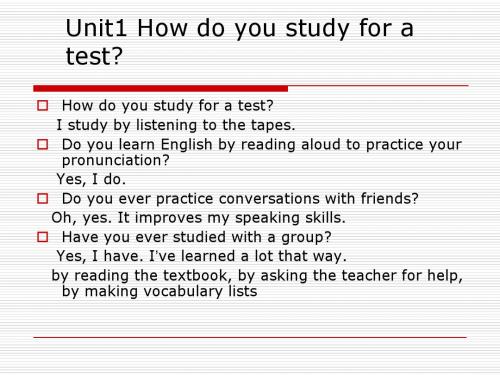
3. find用法 -----found(过去式)
1)find sth/sb +adj.
2) find+ doing sth +adj.
I find him friendly.
I find watching movies boring. 3) find it + adj.+ to do sth I find it boring to watch movies.
抱怨 complain about sth/doing sth complain to sb about 对某人抱怨… 把…变为… change …into… 他把坏事变成了好事。 He changed the bad things into good things. 在…的帮助下with the help of = with one’s help With the help of 七个小矮人=with 七个小矮人’s help 把…比作… compare…to… 把学生比作花朵 compare the students to flowers 代替 instead of 我们决定周末去钓鱼而不是打篮球。 We decided to go fishing instead of to play basketball. 他们不但不帮我,还笑话我。 Instead of helping me, they laughed at me.
写下
SectionA 一.重点单词变化
pronounce (v.)- pronunciation (n.)
Different (adj.)-differently (adv.)-difference(n.) Frustrat(v.)-frustrated (adj.)--frustrating (adj.) Quick (adj.)—quickly (adv.) Suggest (v.)—suggestion (n.) Help (v.)—helpful (adj.) Use (v.)—useful (adj.)
新目标九年级Unit1课文总结及练习题附答案
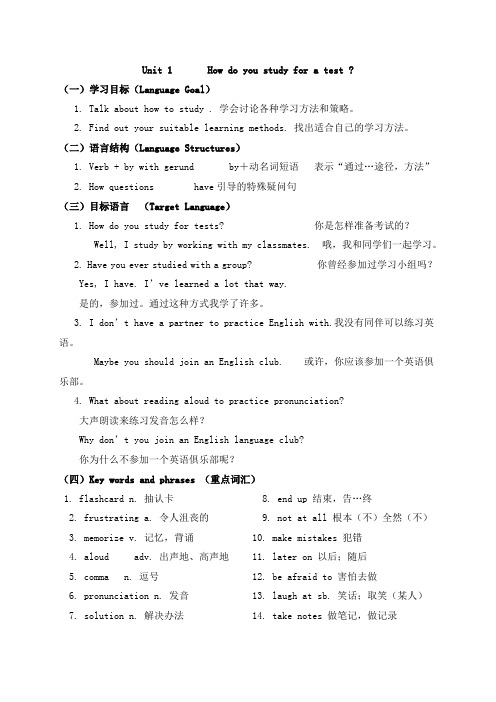
Unit 1 How do you study for a test ?(一)学习目标(Language Goal)1. Talk about how to study . 学会讨论各种学习方法和策略。
2. Find out your suitable learning methods. 找出适合自己的学习方法。
(二)语言结构(Language Structures)1. Verb + by with gerund by+动名词短语表示“通过…途径,方法”2. How questions have引导的特殊疑问句(三)目标语言(Target Language)1. How do you study for tests? 你是怎样准备考试的?Well, I study by working with my classmates. 哦,我和同学们一起学习。
2. Have you ever studied with a group? 你曾经参加过学习小组吗?Yes, I have. I’ve learned a lot that way.是的,参加过。
通过这种方式我学了许多。
3. I don’t have a p artner to practice English with.我没有同伴可以练习英语。
Maybe you should join an English club. 或许,你应该参加一个英语俱乐部。
4. What about reading aloud to practice pronunciation?大声朗读来练习发音怎么样?Why do n’t you join an English language club?你为什么不参加一个英语俱乐部呢?(四)Key words and phrases (重点词汇)1. flashcard n. 抽认卡2. frustrating a. 令人沮丧的3. memorize v. 记忆,背诵4. aloud adv. 出声地、高声地5. comma n. 逗号6. pronunciation n. 发音7. solution n. 解决办法8. end up 结束,告…终9. not at all 根本(不)全然(不)10. make mistakes 犯错11. later on 以后;随后12. be afraid to 害怕去做13. laugh at sb. 笑话;取笑(某人)14. take notes 做笔记,做记录15. enjoy doing sth. 喜欢做…乐意做…16. native speaker 说本族语的人17. make up 组成、构成(五)重点、难点:(Key points and difficulties)1. by 介词,表示“通过…方法或途径”的意思,译成“靠、通过”by后面可以加名词或动名词短语,eg.(1)The house was destroyed by fire. 房屋被火烧毁了。
九年级英语Unit1 How do you study for a test

How do you study for a test?
By Stefanie
Section A
talk about how to study
• How to study Chinese and English?
• 4 Skills • Listening • Speaking • Reading • Writing • △ by + doing 的用法
the
• 2. 沿着、经由 come by the highway 由 公路来 • 3. 由于 by mistake 由于差错 • 4. 被、由some articles by Luxun 一些 由鲁迅写的文章 • 5. 逐批 one by one 一个接一个
When you read pay attention to the structure of the sentence. — How do you study for test? — Well, I study by working with my classmates. — Have you ever studied with a group? — Yes, I have. I’ve learned a lot that way. — I don’t have a partner to practice English with. — Maybe you should join an English club.
• shake sb. by the hand
和某人握手
ቤተ መጻሕፍቲ ባይዱ
• I study English by watching English movie. 我通过看英文电影学习英语。
• By作为介词的含义有很多: • 1. 在…旁边、靠近 There is a power station by river. 河边有一个电厂。
- 1、下载文档前请自行甄别文档内容的完整性,平台不提供额外的编辑、内容补充、找答案等附加服务。
- 2、"仅部分预览"的文档,不可在线预览部分如存在完整性等问题,可反馈申请退款(可完整预览的文档不适用该条件!)。
- 3、如文档侵犯您的权益,请联系客服反馈,我们会尽快为您处理(人工客服工作时间:9:00-18:30)。
Unit 1 How do You Study for a Test?I.Background InformationStudents: Junior high school students, class 3, Grade 9 Members: 50 studentsLesson Duration: 45 minutesII.Teaching Aims:1. Knowledge ObjectsBy the end of the lesson, students should be able to:1)grasp some phrases about the ways of studying English, such as listening to tapes, reading the textbook, and so on.2) master the main sentence structures.How do you study for a test? How do you study English? I study by doing … I study English by doing… How can I improve my listening skills? You should study by doing…3) master the use of by.靠近、在.......旁边by the lake不迟于、到......时为止by this night表示方法、手段,可译为通过、凭借、乘坐、用by bus逐个、逐批one by one按照、根据by your watch与take , hold等动词连用,说明接触身体的某一部分take sb. by hand用于被动句中,表示行为主体,常译作“被”、“由”等English is spoken by many people.词组: by the way 顺便问一下by oneself单独by and by 不久以后2. Ability ObjectsBy the end of the lesson, students should be able to:1) use the new phrases and sentence structures to make a dialogue about the different ways of studying for a test. Students can also give some advice to improve one’s learning s kills.2) use these skills to improve their learning skills, and find the way which suit him or her.3) improve their efficiency of studying.3. Moral ObjectsBy the end of the lesson, students should be able to:1) grasp the ways of studying, and care more about the efficiency of studying.III. Language Contents and Skills1)Phrasesby listening to tapes, by reading textbook, by working withfriends, by asking the teacher for help, by making vocabulary lists, by making flashcards, by doing exercises, by doing some reciting, by going over the exercises and notebooks, by taking part in classes after school, by getting a tutor2) Main Sentence StructuresHow do you study for a test?I study by doing …How do you study English?I study English b y doing…How can I improve my listening?You should study by doing…3. FunctionStudents can use these words to talk about the different ways of studying for a test, and give some advice.4. TopicThe different ways of studying for a test5. Target langueHow do you study for a test?I study by doing …How do you study English?I study English by doing…How can I improve my listening?You should study by doing…IV. Teaching AidsPPT, pictures, blackboard, chalkType of the lesson: vocabulary, speaking, pair work.V. Teaching ProceduresStep 1: Lead-in (2 minutes)T: Good morning, boys and girls.Ss: Good morning, teacher.T: This week is busy. Because we still have lessons tomorrow. However, the terminal examination is also coming. Are you ready for it?Ss: No.T: I hope that all of you can do your best to finish this term.In order to achieve this goal, you should review our lessonsand make a good preparation.Step 2: Learn the New Phrases and Sentences (12 minutes)T: OK. Let’s come to our new lesson. Unit 1 “How do YouStudy for a Test?” Now, look at the screen, please. First, we will learn some new phases. I will show you some pictures, you should watch it carefully. We can see there are some students who are studying for a test. How do they study for an English test? In the first picture, the boy studies by listening to tapes. In the second picture, they study by reading the textbook. In the third picture, they study by working with friends. Please read these sentences loudly.Ss: How do they study for an English test? The boy studies by listening to tapes. They study by reading the textbook. They study by working with friends.T: Now, look at the screen, please. How do they study for an English test? Firstly, the boy learns English by asking the teacher for help. Please pay attention to ask sb. for help. It means “向某人寻求帮助”. Next one, he learns English by making vocabulary lists. It means “他通过列单词表来学习英语”. The last one, she learns English by making flashcards.It means “她通过制作抽认卡来学习英语”. Please read these sentences loudly. Ss: How do they study for an English test? The boy learns English by asking the teacher for help. He learns English by making vocabulary lists. She learns English by making flashcards.Step 3: Pair Work (15 minutes)T: Ask your partner how he or she studies for a test. I will give you 5 minutes to prepare it. Time is over. Who wants to try? Yes, please.Sa: How do you study for a test?Sb: I study by listening to tapes.T: Good. Sit down. Any volunteer?Sa: ...Sb: …T: OK. I’m very glad that all of you master these wordsand sentences quickly and correctly. There are still otherways to study for a test. Let’s see this PPT. I study by doing exercises/ doing some reciting/ going over theexercises and notebooks/ taking part in classes afterschool/ getting a tutor.可以通过练习、做复述、温习笔记和练习、上课外辅导班、请家教来学习。
